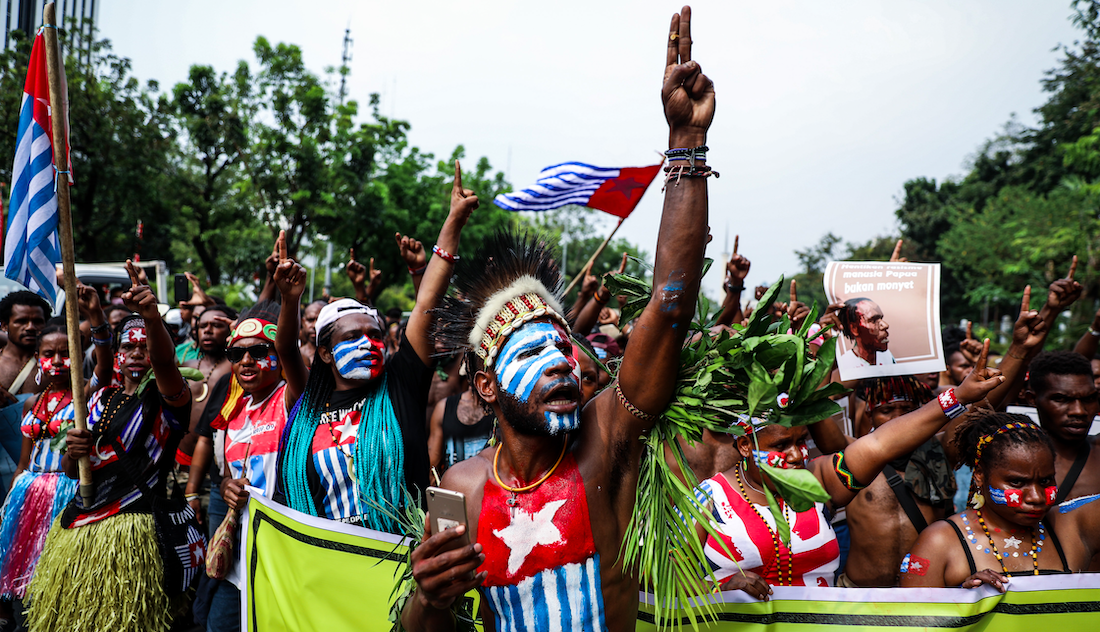A separatist conflict in the Indonesian archipelago is escalating into one of the most chaotic conflicts in the Pacific. Officially Western New Guinea (WNG) is a province of Indonesia, but the population there have seen themselves as distinct from the island populations to their west. Papuan separatists have been calling for independence from Jakarta for decades.
The Organisasi Papua Merdeka (OPM) have been at the forefront of the Western New Guinea independence movement. Since the early 2000s, the OPM and affiliated militant groups have been engaged in a guerrilla war against the Indonesian authorities, involving dozens of shootings and several bombings.
An escalation began in August 2019, when violent pro-independence riots in the region. Shootings and other targeted violence against Indonesian security forces have also increased. In early May of this year, Indonesian authorities arrested 38-year-old Papuan independence leader, Victor Yeimo, for his alleged role in orchestrating the spate of civil unrest.
The current flare-up has been marked by the brutal tactics used by authorities in Jakarta. Throughout the conflict, the Indonesian government has been regularly accused of human rights abuses especially after conducting operations against non-combatants. They include attacks on OPM-sympathetic civilian and jailing people who raise West Papua’s national Morning Star flag on charges of treason. In the latest round of violence, revenge killings and indiscriminate attacks against civilians have become routine. Reuters reported that after a recent incident in which an Indonesian soldier was killed by militants in the Papua highlands, security forces tortured villagers in the area and shot at least one during interrogations.
As more violence continued in the wake of that incident, the Indonesian government has deployed more special operations forces to restive regions in Papua. This deployment of troops as well as formally designating separatist sympathisers as “terrorists”, led several human rights groups to warn of an impending crackdown on villages throughout the region.
These fears have intensified in recent days, as Jakarta announced a manhunt for some “170 terrorists” in Papuan cities. Community leaders argue that this initiative has given license to Indonesian forces to kill indiscriminately. “By treating them as terrorists, the military will be free to shoot anyone who is suspected” of belonging to a militant group, said a local church pastor in Jayapura, the regional capital and largest city in Papua. On 4 June, Indonesian and foreign media reported that internet access had been cut, with some outlets asserting the move was a means to conceal security operations. It is a fact that the government has been cutting off Papua from the outside world for decades by measures that included restricting foreign visitors, especially foreign journalists. Removing internet access would not be out of bounds as an information-suppressing tactic.
Increased coverage of the separatist struggle has brought the conflict, previously unknown to much of the world outside Indonesia, to the fore. In addition to Jakarta’s long history of brutality against the pro-independence movements and sympathisers, the main drivers and interests of the government have also been laid bare. Perhaps the most important example of this is the natural resources factor. For example, Papua is home to some of the largest metal mines in the world, with the tenth biggest copper reserves and perhaps the single biggest gold reserves on earth. These facts highlight how the region’s instability is clearly linked to the revenues these resources accrue.
The only long-term resolution to this multi-generational conflict will be in the form of some independence for the people of Papua. Only in this way can the local populations of these territories hope to gain control of their own destinies and bring substantive lasting peace to the region.










Join the discussion
Join like minded readers that support our journalism by becoming a paid subscriber
To join the discussion in the comments, become a paid subscriber.
Join like minded readers that support our journalism, read unlimited articles and enjoy other subscriber-only benefits.
Subscribe